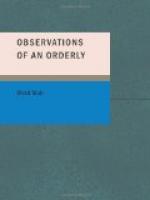One of my patients had been a subterranean lavatory attendant. You would have thought his ambitions—after visits to Egypt, Malta, the Dardanelles and France—might have soared to loftier altitudes. He had survived hair-raising adventures; he had taken part in the making of history; although wounded he had not been incapacitated for an active career in the future; and he was neither illiterate nor unintelligent. Yet he told me, with obvious satisfaction, that his place was being kept open for him. I was, as it were, invited to rejoice with him over the destiny which was his. I may add that the singular revelations which he imparted as to the opportunities for extra earnings in his troglodyte trade extorted from me a more enthusiastic sympathy than might be supposed possible.
That agreeable domestic pet, homo sapiens, remains unchanged even when you dress him up in a uniform and set him fighting. He is always consistently inconsistent; he is always both reasonable and unreasonable. You can try to cast him in a mould, but he resumes his normal shapelessness the moment the mould is removed. Expose him to frightful ordeals of terror and pain, and he will emerge grumbling about some petty grievance or carrying on a flirtation with another man’s wife or squabbling about sectarian dogmas or gambling on magazine competitions or planning new businesses—in fact, behaving precisely as the natural lord of creation always does behave. No member of our hospital staff, I imagine, will ever forget the arrival of the first batch of exchanged British wounded prisoners; It was the most tragic scene I have ever witnessed. It is a fact, for which I make no apology, that tears were shed by some of those whose task it was to welcome that pitiful band of martyrs. We had received convoys of wounded many a time, but these broken creatures, so pale, so neglected, so thin and so infinitely happy to be free once more, had a poignant appeal which must have melted the most rigid official. (And we are neither very official, here, nor very rigid.) Well, amongst these liberated captives was one who told a sad tale of starvation at his internment camp. There is little doubt that it was a true tale, in the main. On that I make no comment. I simply introduce you to this gentleman, who had been restored to his native land after ten months of entombment, in order to mention that on the following morning, when his breakfast was placed before him, he turned up his nose at it. Loudly complaining of the poorness of the food, he leant out of bed, picked up a brown-paper parcel which had been his only luggage, and produced from it some German salted herring, which he proceeded to eat with grumbling gusto.




